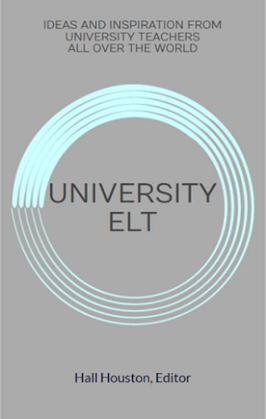Two by Houston
Two by Houston
by Christopher Walker
Hall Houston has been a regular contributor to the IH Journal for years, but we are not the only people he writes for. He has also written a multitude of fine resource books for teachers in different contexts, and in this edition of Recommended Reading I have the pleasure of reviewing two of his recent efforts.

101 EFL Activities for Teaching University Students
This resource is aimed at teachers working in a university context and devotes a whole section to the sorts of Getting-To-Know-You-Activities that university teachers will appreciate as they face the daunting task of learning the names and personalities of a large number of students. But these activities will work just as well in the more regular EFL contexts that many of us inhabit - even though my classes are limited in size to around a dozen students, I do tend to have seven or eight of them, and the challenge of learning names and getting to know who I’m teaching and what they’re like is similarly pronounced. Houston’s book provides many games and activities to help here.
And there is help elsewhere, too, as you would expect in a book packed to bursting with activities that the teacher can use or modify for use in their classroom, be it in a school or university setting. While the section on getting to know your university might seem too specific to that domain to be of use to the rest of us, Directors of Studies looking to induct new teachers into their school will still want to take a look at Houston’s suggested activities. The section entitled ‘Ending the Semester Gracefully’ - the adverb is apposite, in my experience - provides a wonderful overview of activities to help make the most of what remains of your students’ enthusiasm for learning as the end of the year approaches.
Besides the assortment of activities that Houston provides across wide-ranging teaching contexts, there is space too for teacher reflection, something that is often lacking in books of this type. As I sit writing this review, yesterday’s staff meeting is a recent memory and I agree with the exhortation to reflect on how we approach these meetings. Was I too quiet this time around? Did I provide the necessary support to my colleagues when questions were raised? Can I remember much of what was discussed without reference to the meeting minutes? I would do well to reflect on the experience, and consider how I want to approach the next meeting - and thanks to Hall Houston, I feel more ready to do so.
Overall, I heartily recommend this book. There will be activities here that more experienced teachers will already know a version of, but there were some that were new to me, and after so many years in teaching, that’s a real boon. If your school has the budget available, I recommend the printed version in particular - it’s priced fairly, and will prove a better resource in the long run if it’s something that your teachers can grab from the shelf when they need a little pre-lesson inspiration.
101 EFL Activities is available on Amazon here.

University ELT
While writing the first of this issue’s recommended texts, Hall Houston reached out to a number of teachers working in universities around the world. They submitted a description of their own favourite classroom activities, which Houston has edited into the shape of this book, University ELT.
This book lacks the polish of Houston’s solo effort, but it still has plenty going for it. Some of the ideas contained on the pages here have found their way into my own classroom practice; others, less so. But that does not mean that ideas like using horoscopes in class wouldn’t work for the right teacher - it’s simply that that teacher isn’t me.
Kathryn Akasaka’s system of using index cards for recording information about her students is a clever organisational technique that I recommend - it seems so simple in retrospect that I am amazed that I have taught for so long without having thought of it myself. That’s the beauty of books like this, where the ideas are sourced from such a diverse range of voices - it is easy for teachers (like myself) to think they have come up with everything they need, only to find there are alternative or novel approaches that deserve their place in our teaching toolkits.
Jamie Emerson’s idea of Dialogic Feedback for written work is masterfully presented and justified, and I think would be an ideal practice for many teachers to adopt - it makes more sense to have your student reflect on their writing than for the teacher to labour for hours on meticulous notes that highlight errors in the written text; in the first case, the student might see for themselves where their work is strong or weak, and in the second, that feedback is usually ignored anyway.
University ELT is not a perfect book, and one definite weakness is in the way that it has been organised. The organisation of 101 EFL Activities makes perfect sense - you begin with activities that will bring your students into the classroom, and finish with those that will show them out again. University ELT instead is arranged by author alphabetically, which is slightly annoying given that the last writer, Tory Thorkelson, presents an activity designed to help the teacher learn their students’ names - something that you would rather find out about earlier on than later.
For those who know the British band Radiohead, University ELT is very much The Amnesiac to 101 EFL Activities’ Kid A - a worthy companion, but perhaps more one for the completists. I am one such completist, so I bought the Kindle version on its release. The book is well-priced and I’m glad that I own a copy, especially as the reading experience is better in this case than with the more expansive 101 EFL Activities. University ELT is more about describing activities than laying out the procedure or exemplifying through the occasional picture, and this makes it a better book to sit and read from start to finish.
University ELT is available from Amazon here.